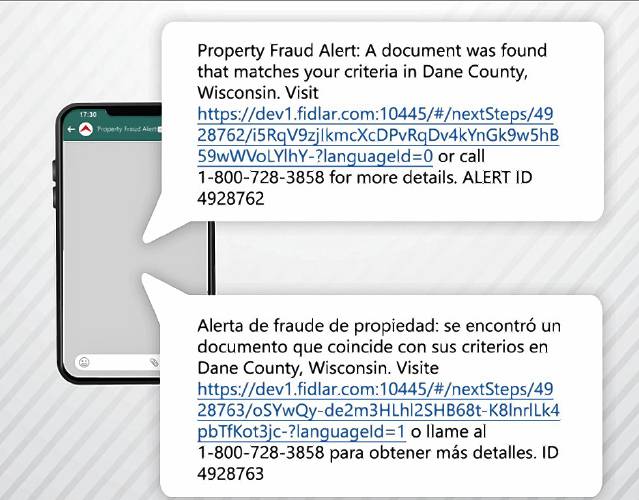Alert system can keep people from taking ownership of your home

A typical property fraud alert text Fidlar Technology—Courtesy
| Published: 09-01-2024 12:00 PM |
Consider this scenario: You go away on vacation and then come home to find that somebody has bought your house without your knowledge and without paying you anything. They lock you out, and your only remedy is to take them to court.
Sounds far-fetched, but maybe not.
This was the situation last year at Graceland, Elvis Presley’s mansion, which was victimized by an obscure but growing scam called quit-claim fraud. While it doesn’t seem to have cropped up in New Hampshire yet, it could show up at any time.
“Of all the frauds out there, I want to say it’s the worst. It can be a real nightmare for the people who are victimized,” said Brandon Garod, senior assistant attorney general in the state’s Consumer Protection and Antitrust Bureau.
A quit-claim deed is a way to transfer property outside of a traditional sale.
“Say you owned a house and wanted to pass it to your children but didn’t want an exchange of money, that’s a quit-claim,” said Garod. It requires filing documents with the county registry of deeds office, creating a legal change of ownership.
Garod said no formal consumer complaints have been filed about quit-claim fraud, although some volunteers who staff the bureau’s fraud hotline have fielded calls about possible cases.
“Increases in technology and AI have made it easier to forge meaningful documents … falsifying quit-claim deeds that are passable to the register (of deeds office),” said Garod.
Article continues after...
Yesterday's Most Read Articles
The scammer needs to know data about the real homeowner and property such as names, description, parcel numbers and loan status, but in the digital world that information is hard to keep secret.
“You have to be careful about what you’re revealing about yourself online,” said Garod.
The only real protection is to have an alert placed on your records filed with the county. That won’t prevent a fake quit-claim deed from being filed but can let you know that it has happened quickly enough to fend off problems.
New Hampshire is one of 20 states that has contracted for such an alert system with Fidler Technologies of Iowa, which sells systems to manage land records.
All that’s required is to call a toll-free number or fill out an online form, giving your name and the county you live in. Any time that any document that carries your name is recorded with the county Registrar of Deeds, you’ll get a text or email alert with a link to see what happened. It’s free.
If you have a common name, this means you might get a lot of alerts for other people. But that’s OK, said Peter Ollis, property fraud alert specialist with Fidlar Technologies.
“Our goal was to get notifications out as quickly as possible, in case there is a case of fraud. We send alerts even if it’s a legitimate transaction,” Ollis said. “Our goal is not to have alerts only when there’s a case of fraud” because that’s too difficult to detect in time.
“Don’t mind if you get a few false positives,” he said since heading off just one scam attempt is worth it.
The quit-claim fraud is just one of many scams happening in today’s world, although it’s unusual because it doesn’t require active participation by a victim.
Most scams, including this one, require the criminals to have information about the victim. This is why thefts of customer data from companies by hackers are so dangerous: the more people who know can link together your name, address, Social Security number, family names and other information, the more likely it is that they can try to scam you.
To sign up for the Fraud Alert System in Merrimack County, go to merrimackcountydeedsnh.com/LandmarkWeb/FraudAlert







 ‘A little piece of everything I like’: New Pittsfield barbershop brings more than a haircut to downtown
‘A little piece of everything I like’: New Pittsfield barbershop brings more than a haircut to downtown NH judge decides to pause Trump’s birthright citizenship order
NH judge decides to pause Trump’s birthright citizenship order Canterbury honors ‘real heroes’ with updated Military Veterans’ Project
Canterbury honors ‘real heroes’ with updated Military Veterans’ Project Look, up in the sky! It’s… an Airstream trailer?
Look, up in the sky! It’s… an Airstream trailer?
